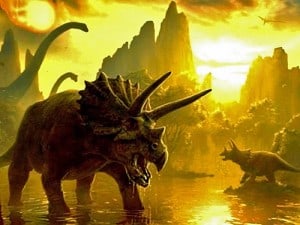Can a radio show be apocalyptic? Well, that all depends on what you think “apocalyptic” means.These days, the word apocalypse is generally associated with the ends of things. It conjures up images of fire and brimstone, destruction and death. But really, the word apocalypse comes from Greek, meaning uncovering, revealing.
That didn’t stop Radiolab, the NPR show featuring science storytelling. Recently Radiolab has ventured into live touring shows, and their latest live show was called Apocalyptical, a show all about the ends of things. Radiolab is always fascinating to listen to, and this live show as no exception. If you’re not familiar with Radiolab, think narrative nonfiction in the style of This American Life, only with a focus on stories with scientific interest.1
The full two-hour show is well worth watching, but one segment in particular stood out to me. It’s a story on the latest scientific theory of the extinction of the dinosaurs. If you’re like me, you were probably taught some version of the theory that a massive meteor impact resulted in a global, rapid cooling trend that basically froze the dinosaurs out of existence and created an opportunity for warm-blooded, fur-covered mammals that could survive the big chill.
But what if new investigations were revealing that that story wasn’t exactly true, and in fact the reality was almost the exact opposite? That’s the claim of a startling new theory explored during Radiolab’s Apocalyptical. It’s a long segment, about 50 minutes, but it’s worth it. In fact, I might even call it, well, revealing.
******
Dinosaur courtesy Flickr user Gabriel Andres Trujillo
- Even if you can’t catch it on your local NPR station, Radiolab is available as a podcast for download, which is how I usually listen. ↩



